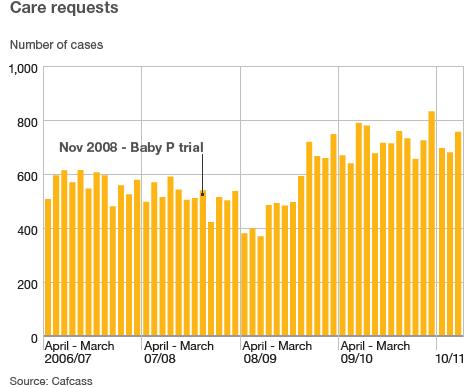Barnardo's says court delays damage children
- Published
Anthony Douglas, Children and Family Court Advisory and Support Service, says delays are damaging
Vulnerable children are being "damaged" by delays in care proceedings in England and Wales, a charity has said.
Barnardo's wants to see a 30-week limit after figures showed children waited an average of 57 weeks - sometimes in abusive homes - for county courts to make care or supervision orders.
In family courts, proceedings took an average of 45 weeks, it said.
A Ministry of Justice spokesman said the government was "committed to reducing unnecessary delays".
Figures obtained by Barnardo's show that at the end of 2008 there were a total of 8,677 care cases in court, some of which may involve more than one sibling.
By the end of 2009, that number had risen by 50% to 12,994.
According to the Children and Family Court Advisory and Support Service (Cafcass) in England, new applications accounted for less than half of this increase - suggesting the courts were taking longer to close a significant number of cases, it argued.
Barnardo's chief executive Martin Narey said uncertainty had spread through family courts, with "additional, sequential expert assessments being routinely ordered".
"This, paired with the evident lack of credence given to social workers, is causing unnecessary delay," he said.
"The courts need urgently to reflect on the damage these delays are having on extremely vulnerable children."
He said a year of a child's life was "an inordinate amount of time for them to be trapped in desperate limbo, unclear of their future and very possibly at risk".
Barnardo's said the figures - which were revealed in written answers to Parliamentary questions from Liberal Democrat MP Annette Brooke - also revealed a "postcode lottery" for children awaiting care.
In London, county court proceedings in 2008-09 took an average of 65 weeks, while similar proceedings in Humber and South Yorkshire took 46 weeks.
The figures covered only cases where a care or supervision order was made, not cases where orders were refused, where emergency protection was given, or where children were put in secure accommodation.
'Urgent' action
There are no comparable figures in Scotland, where care decisions are handled by the welfare-based Children's Hearing system rather than the courts.
Family lawyer Christina Blacklaws said social workers dealing with public law cases were often inexperienced, lacking in confidence and simply "overwhelmed" by their workload.
She told BBC Radio 4's Today programme: "In London, we're running at 33% vacancy rate for social workers... so even if they have the ability to undertake these complex and difficult assessments, they just don't have the time."

A lack of court judges and the number of days they sat further delayed proceedings by months, she added.
A Ministry of Justice spokesman said a family justice review was under way and 4,000 extra sitting days were added to family courts this year to deal with cases.
"We are also exploring proposals to make better use of local performance groups to give local decision makers more ownership of the system, empowering them to tackle the local causes of delay," he said.
Baby P influence
Cafcass said care applications were up by more than a third last year compared to the year before, in part due to the effect of the Baby Peter case.
In total, figures from the body show, external there were 8,694 applications between April 2009 and April 2010. In 2008/09, the figure was 6,488.
Baby Peter was 17 months old when he died after months of abuse at the hands of his mother and her boyfriend, in Haringey, north London, in August 2007.
Cafcass found that in almost all care application cases, parents had multiple difficulties, such as domestic violence, drug and alcohol abuse, and mental health problems, which lead to chronic instability and inadequate care for the children.
- Published5 August 2010
- Published13 July 2010
- Published28 June 2010